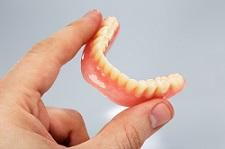Your Denture Options

Need denture near Palmyra NJ? Just because you have substantial tooth loss, don’t believe all is lost. You can have a functional, beautiful smile again, especially when you choose Dr. Huh to craft life and like Denture near Palmyra NJ. Dentures restore proper biting, chewing, and speech and give your facial appearance and self-confidence a boost.
Life without teeth
Even partial tooth loss changes personal appearance and is just plain embarrassing. In addition, smile gaps damage the size, shape, and density of gum tissue and jaw bone. After extraction, bite height recedes quickly, and facial features take on an aged look.
Tooth loss impacts nutrition, too. Researchers at King’s College in London have found that even partially edentulous individuals over the age of 50 give up some healthy food choices simply because they cannot bite and chew them effectively.
In short, tooth loss challenges people in many ways. To help, your dentist in Palmyra NJ frequently recommends tooth replacement with dentures.
Denture options
When you see Dr. Huh for a denture consultation, expect a complete oral examination, X-rays, and impressions. Impressions allow the dental lab to construct dentures from a lifelike acrylic and in the case of partial denture, frames, and clasps from lightweight metals. Choice and construction of your particular appliance will depend on your facial structure, the number of teeth lost, and other factors.
What are dentures?
Dentures are replacements for missing teeth that can be repeatedly removed and put back into your mouth. While dentures take some getting used to, and will never feel exactly the same as one’s natural teeth, today’s dentures are natural looking and more comfortable than ever. There are two main types of dentures: full and partial. Your dentist will help you choose the type of denture that’s best for you based on whether some or all of your teeth are going to be replaced and the cost involved.
How do dentures work?
With full dentures, a flesh-colored acrylic base fits over your gums. The base of the upper denture covers the palate (the roof of your mouth), while that of the lower denture is shaped like a horseshoe to accommodate your tongue. Dentures are custom-made in a dental laboratory from impressions taken of your mouth. Your dentist will determine which of the three types of dentures described below is best for you:
- Conventional Full Denture: A conventional full denture is placed in your mouth after any remaining teeth are removed and tissues have healed. Healing may take several months, during which time you are without teeth.
- Immediate Full Denture: An immediate full denture is inserted immediately after the remaining teeth are removed. (Your dentist takes measurements and makes models of your jaw during a prior visit.) While immediate dentures offer the benefit of never having to be without your teeth, they must be relined several months after being inserted. The reason is that the bone supporting the teeth reshapes as it heals, causing the denture to become loose.
- Partial Denture: A partial denture rests on a metal framework that attaches to your natural teeth. Sometimes crowns are placed on some of your natural teeth and serve as anchors for the denture. Partial dentures offer a removable alternative to bridges.
How long before I get used to my dentures?
New dentures may feel awkward or uncomfortable for the first few weeks or even months. Eating and speaking with dentures might take a little practice. A bulky or loose feeling is not uncommon, while the muscles of your cheeks and tongue learn to hold your dentures in place. Excessive saliva flow, a feeling that the tongue does not have adequate room, and minor irritation or soreness are also not unusual. If you experience irritation, see your dentist.
How do I take care of dentures?
Cleaning your dentures and keeping them in good shape is very important. At a minimum, you should see your dentist annually for a checkup on how the denture is fitting and that no changes or fixes need to be made. Here are tips for caring for your dentures in between visits:
- When handling your dentures, stand over a folded towel or basin of water. Dentures are delicate and may break if dropped.
- Don’t let your dentures dry out. Place them in a denture cleanser soaking solution or in plain water when you’re not wearing them. Never use hot water, which can cause them to warp.
- Brushing your dentures daily will remove food deposits and plaque, and help prevent them from becoming stained. An ultrasonic cleaner may be used to care for your dentures, but it does not replace a thorough daily brushing.
- Brush your gums, tongue and palate every morning with a soft-bristled brush before you insert your dentures. This stimulates circulation in your tissues and helps remove plaque.
- See your dentist if your dentures break, chip, crack or become loose. Don’t be tempted to adjust them yourself — this can damage them beyond repair.
Do you have any questions about dentures? Call Rapha Dental to schedule an appointment with your dentist 856-829-8668.
Life with dentures
While wearing, speaking and eating with dentures in your mouth takes some getting used to, practice makes perfect as the old saying goes. Dr. Huh will see you for follow-up visits as needed to ensure you experience no slippage or oral irritation.
Also, be sure to care for your denture with an ADA-accepted toothpaste or soak to remove plaque, stains, and odor. If you damage your appliance, be sure to call the office right away for repair.
Have a complete smile
You can when you explore denture options with Dr. Huh, denture near Palmyra NJ. Please contact us today for a consultation appointment.
